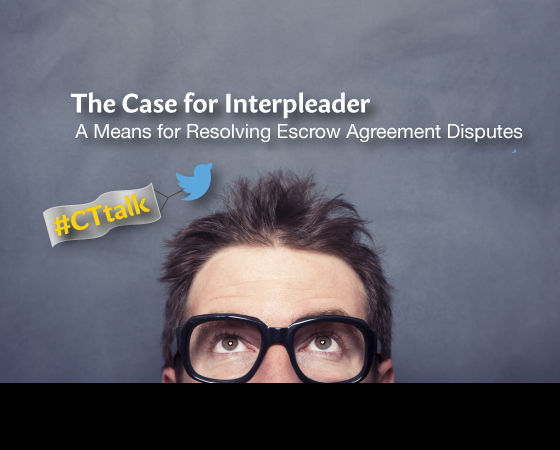The Case for Interpleader
By Douglas M. Karlen
Vice President and Regional Counsel
Chicago Title Insurance Company
When parties to an escrow agreement dispute the disposition of escrow deposits, the escrowee’s interpleader action may be the best means of resolving the impasse. A recent interpleader case, for example, shows how sloppy drafting can lead to problems that require a court to clean up an escrow mess. See Wiczer v. Wojciak, 2015 IL App. (1st) 123753.
BACKGROUND
Details, LLC owned a car wash business and the real estate upon which the business operated. The business experienced financial difficulties. At the time in question, Details owed $2.15 million on its mortgage. Wojciak was interested in purchasing the business and real estate. The parties agreed on a purchase price of $2.15 million, but Wojciak was willing to pay only $1.75 million. Four individual members of Details, LLC agreed to put up $400,000 as earnest money to cover the difference.
With some degree of understatement, the appellate court says, “Although this circumstance was unusual in that the sellers, as opposed to the buyer, were making an earnest money deposit, Wojciak wanted to ensure that the sale closed.”
An escrow agreement was prepared before an asset purchase agreement. The escrow agreement identified seller as Details, LLC and buyer as “Details Acquisition, LLC, an Illinois limited liability company in formation.” The escrow agreement appointed Wiczer, Wojciak’s attorney, as “temporary escrowee” and Ticor as the escrowee. Notwithstanding the identification of parties, the only signatories to the escrow agreement were the four individual members of Details, LLC, who had agreed to put up the $400,000. Neither Details, LLC, as seller, nor Wojciak as buyer, nor Ticor as escrowee signed the escrow agreement. Details Acquisition, LLC, the buyer, was never formed. The four individual members of seller forwarded the $400,000 to Wiczer, who deposited the funds in his IOLTA account. Wiczer never sent the money to Ticor.
The escrow agreement required deposit of earnest money by the seller and return of the earnest money to buyer, instead of seller, if the transaction did not close.
Wiczer testified that Wojciak wanted the earnest money if the transaction did not close because he was “concerned from the start that the car wash purchase was problematic and he wanted protection to at least cover his expenses.” Counsel for the four individual members testified that they agreed to deposit the $400,000 in escrow “because they owed their bank $400,000 more than Wojciak was willing to pay for the business and they wanted to mitigate their losses and sell the business and the real estate.”
Later, an asset purchase agreement provided that earnest money was to be deposited by buyer in accordance with an escrow agreement to be executed by the parties and simultaneously delivered and attached to the asset purchase agreement. Earnest money, under the asset purchase agreement, was to be returned to buyer if the transaction did not close. The escrow agreement was never attached. The asset purchase agreement was signed by Details, LLC, as seller by its manager, and by Details Acquisition, LLC “to be formed,” as buyer by Wojciak.
In October of 2009, Wojciak served notice that he was terminating the purchase, as permitted by provisions of the asset purchase agreement. There was no allegation of breach of contract. In quick succession, the four individual members of Details, LLC made demand on Wiczer for the return of the $400,000 deposit; Wojciak made demand on Wiczer for delivery to him (Wojciak) of the $400,000; and Wiczer claimed $98,250 from the deposits as Wojciak’s expenses.
Wiczer filed an interpleader action, seeking guidance from the court for the proper disposition of the funds held by Wiczer. The four individual members and Wojciak all filed cross-complaints, each seeking recovery of the deposits. After a trial, the trial court found in favor of the four individual members and ordered Wiczer to return the deposits to them. The appellate court affirmed.




